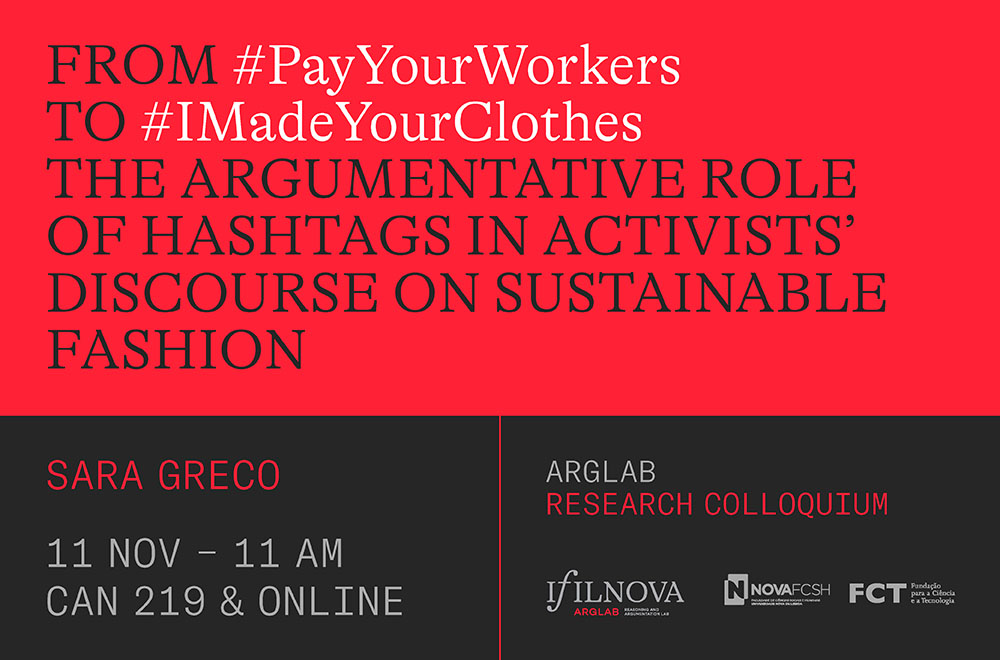Sara Greco on “From #PayYourWorkers to #IMadeYourClothes: The argumentative role of hashtags in activists’ discourse on sustainable fashion”

“Hashtag activism” in Twitter discourse has become the subject of scholarly attention, especially concerning subjects such as political movements such as the one originated around the #meetoo hashtag (Mohammed, 2019). Recently, the role of hashtags has attracted interest in relation to digital activism related to sustainable fashion (Orminski et al., 2020; Karamalak & Cantoni, 2021; Street, 2022), given the success of their campaigns.
While there are linguistic studies of hashtags as social media metadiscourse (see Zappavigna, 2018), to our best knowledge, the function of hashtags has not been investigated empirically in relation to activists’ argumentative discourse. This paper introduces an interpretation of different argumentative functions that hashtags perform in activists’ discourse targeting the fashion industry. I argue that the argumentative functions of hashtags should be considered taking into account three dimensions:
- The variety of speakers participating in connective action enabled by social media (Highfield, 2016).
- The different argumentative roles played by hashtags: propositions at issue, standpoints or arguments.
- Whether the considered social media posts are responding to external argumentation or not (for example making reference to fashion brands’ discourse), in the broader polylogical discussion on sustainable fashion (Aakhus & Lewiński, 2017; Greco & De Cock, 2021).
I argue that, depending on the combination of these three aspects, digital fashion activists’ discourse, supported by specific hashtags, can play different argumentative functions. As an illustration, I take two different cases from corpora of Twitter and Instagram messages on sustainable fashion. Understanding the different argumentative functions of hashtags contributes to shed light on the complex argumentative activity type(s) of campaigning enabled by digital activism.
Sara Greco, Università della Svizzera italiana – USI
References
Aakhus, M., and Lewiński, M. (2017). Advancing polylogical analysis of large-scale argumentation: Disagreement management in the fracking controversy. Argumentation, 31(1), 179-207. https://doi.org/10.1007/s10503-016-9403-9
Greco, S., & De Cock, B. (2021). Argumentative misalignments in the controversy surrounding fashion sustainability. Journal of Pragmatics, 174, 55-67. DOI: https://doi.org/10.1016/j.pragma.2020.12.019
Karamalak, O., & Cantoni, L. (2021). Rallying hashtags as a tool for societal change in fashion. In T. Sádaba et al. (Eds.), Fashion communication. Cham: Springer. https://doi.org/10.1007/978-3-030-81321-5_18
Mohammed, D. (2019). Managing argumentative potential in the networked public sphere: The anti-#MeToo manifesto as a case in point. In Garssen, B., Godden, D., Mitchell, G. R. and Wagemans, J. H. M. (Eds.). Proceedings of the Ninth Conference of the International Society for the Study of Argumentation (pp. 813-822). Amsterdam: Sic-Sat.
Orminski, J., Tandoc Jr., E. C., & Detenber, B. H. (2020). #sustainablefashion – A conceptual framework for sustainable fashion discourse on Twitter. Environmental Communication, 15(1), 115-132. https://doi.org/10.1080/17524032.2020.1802321
Street, P. (2022). Fashioning the revolution: Digital fashion activism and the narratives of responsibility on Instagram. BA thesis, Queensland University of Technology.
Zappavigna, M. (2018). Searchable talk. Hashtags and social media metadiscourse. London: Bloomsbury Academic.
Other info
To join the session on Zoom, please contact Maria Grazia Rossi at mgrazia.rossi@fcsh.unl.pt for the details.
This event is part of the ArgLab Research Colloquium organised by Maria Grazia Rossi, Giulia Terzian and Gloria Andrada at the Laboratory of Argumentation, Cognition and Language of the NOVA Institute of Philosophy. For any inquiries, please contact Maria Grazia, Giulia, or Gloria.
13 Jan 2023 – Elena Musi (University of Liverpool)
10 Feb 2023 – Judith Simon (Universität Hamburg)
10 Mar 2023 – Neftalí Villanueva (Universidad de Granada)
21 Apr 2023 – Jennifer Lackey (Northwestern University)
19 May 2023 – Sven Bernecker (Universität zu Köln / University of California Irvine)
14 Jul 2023 – Tillmann Vierkant (University of Edinburgh)

